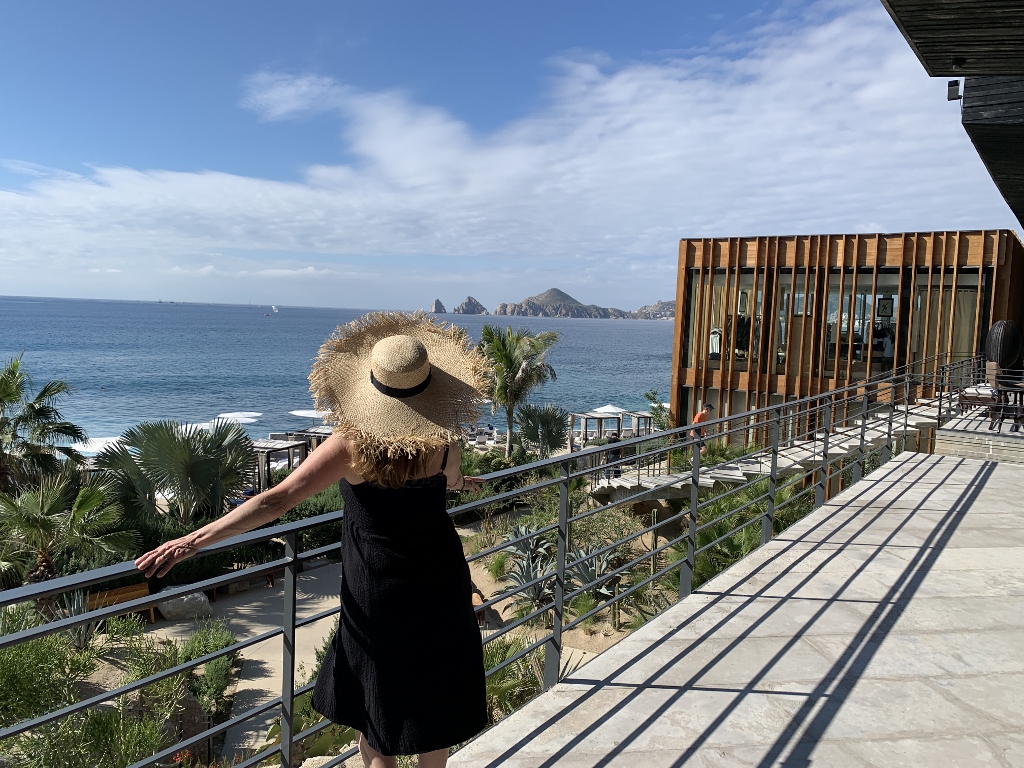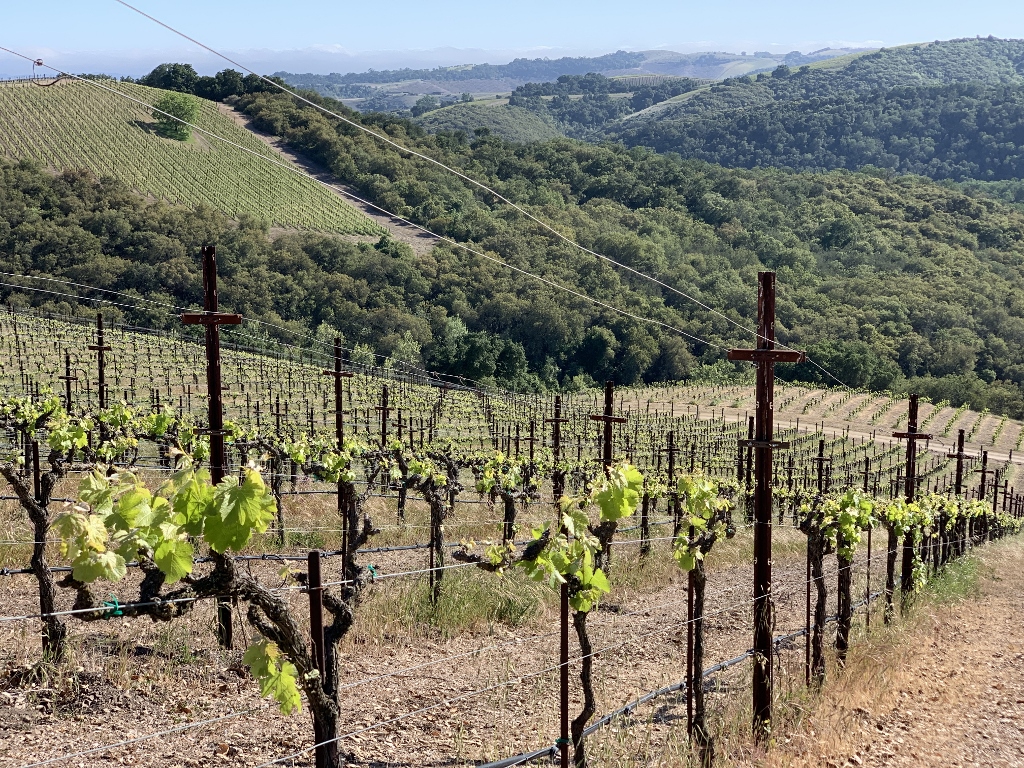
“Need to borrow a pump?” hollered out a farmer. We heard helpful phrases like this one throughout our stay in Paso Robles. Recently, we took a road trip to Paso Robles, which is located just 6 miles inland from the Pacific Coast, and two hours south of Monterey and two hours north of Santa Barbara.

This is the fastest growing wine region in California but it’s still a place where winemakers are helping other winemakers, and neighbors are stepping in to lend a hand. Paso Robles feels like it is going through a boom phase right now with an energy about the town that is impossible not to pick up. But despite the new energy and excitement it still feels very much like a farming community at heart. We think this is one of the reasons why Paso Robles is such an enjoyable community to visit.

Chris Taranto of Paso Robles Wine Country Alliance affirmed “Paso Robles is known for Camaraderie. The Paso Robles wine community believes in the old adage, the rising tide floats all boats. Through sharing and learning from one another, as well as celebrating and promoting each other, we collectively raise the brand awareness of Paso Robles wine. Today, there are more than 200 wineries in the Paso Robles region with 11 AVA’s and over 60 varieties.”
The area has a diverse landscape with a patchwork of rolling hills, varying elevations and terroir that ranges from shale rock to calcareous soils. Large temperature swings and no high moisture pressure, coupled with a long growing season create the ideal growing climate for premium wines. Paso Robles is known for its heritage varietal Zinfandel, Bordeaux and Rhône varietals.
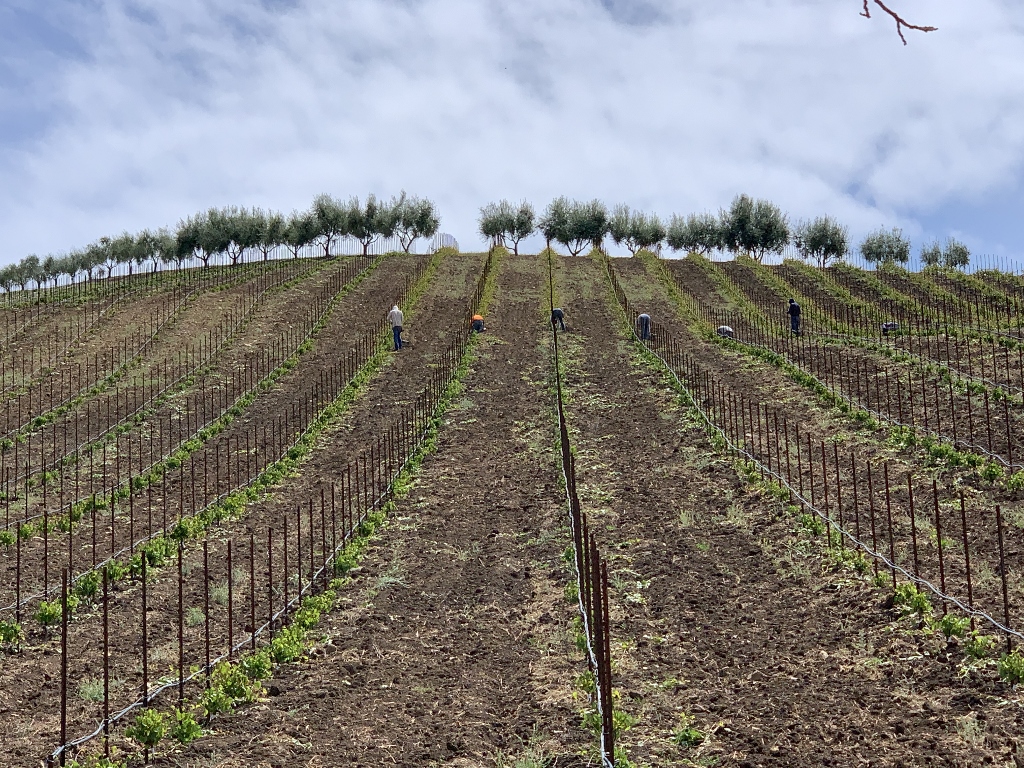
We visited almost 20 wineries in two regions that saddle Highway 101 – the West Side where there are higher elevations, more rainfall and marine layers that reach the inland valleys, and the East Side which is mostly flat, hot and dry. Sharing our update from our visits to some of the top wineries in Paso Robles!
Good to note: there are several wine events during the year, where locals and visitors can meet winery owners and winemakers for tastings and an insider’s view of the wine making business and lifestyle. Click here to learn more.
Owner Ron Denner first made his mark in the world of soil and excavation by developing the Ditch Witch. All the while, he was in search of the perfect dirt to grow premium grapes.
In 1997, he found what used to be a barley farm and put a stake in the ground at Denner Vineyards and today his 130 acres produce 20 grape varieties.
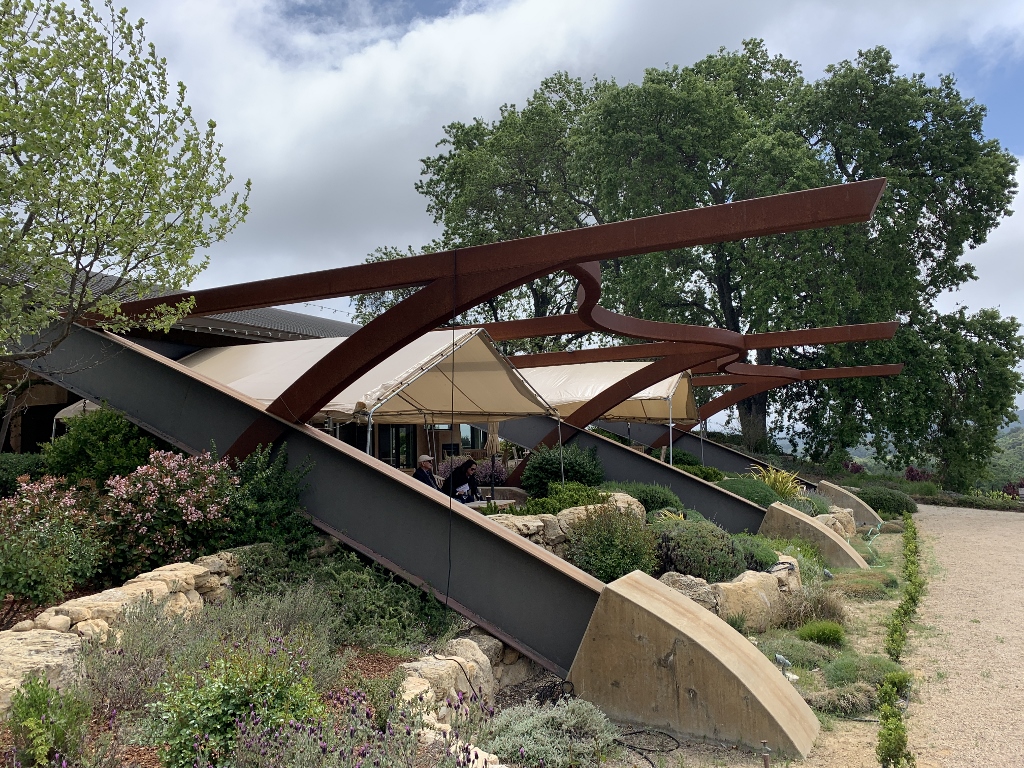
The contemporary architecture of the winery fits into the rolling hills of the vineyard that backs up against the Santa Lucia Range, where guests enjoy outdoor tastings in a friendly setting with beautiful westside views.
We met with Anthony Yount, Winemaker for Denner, who explained how their gentle production and gravity flow process worked. We sampled the 1019 Theresa that showcased honeydew melon, flint, lemon curd aromas. Other tastings including Ditch Digger, Dirt Worshipper and Mother of Exiles labels were standouts too. Their efforts have earned them much acclaim as they have been named by Wine Spectator as one of the top 20 in the world twice in the past decade.
One of the things we noticed when we first met Guillaume, the owner and wine maker at Clos Solene, was his large farmer hands and the dirt proudly worn on them. It was clear that Guillaume is a very active member of the Clos Solene team. Born out of love for his wife Solène, Guillaume composed a passionate poem by buying 28 acres in the Willow Creek District on the Westside in 2007, digging the dirt, tending the vineyard and producing beautiful Rhône blends.

This family-owned boutique winery produces a very limited amount of wine each year. Guillaume’s unique winemaking style grew from his early years as he followed his father’s footsteps in their Languedoc-Roussillon vineyard. He graduated in Oenology and Viticulture in Carcassonne, and became a 6th generation winemaker. He and Solène met, fell in love, moved to Paso Robles and started Clos Solène. Today their young family is growing, and their vineyard is thriving. Their wines have lovely, velvety textures, a bright fruit character and deeper tannins, and capture the mineral complexity from the soil’s shale layers. Guillaume shared with us his secret “He is happiest, be he king or peasant, who finds peace in his home.” – Johann Wolfgang von Goethe For a sip of this love story, book a wine tasting.
Grey Wolf & Barton Family Wines
Transplants from Steamboat Springs, Colorado, Joe and Shirlene Barton dreamt of owning a vineyard and creating premium wines. We met their son Joe Barton, Jr. and his wife Jenny who now run the boutique craft winery family business.
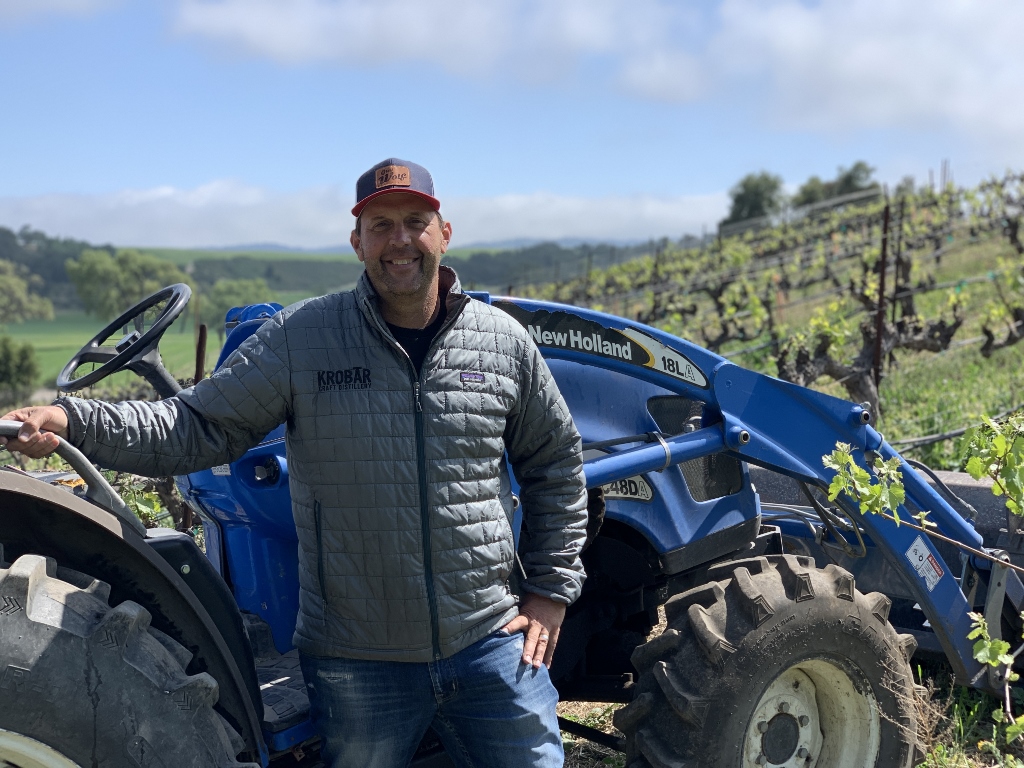
He shared with us that “The warmth and friendliness of the community convinced them to plant themselves in Paso Robles. Keeping with tradition, the GREY WOLF wines still entail small lot, creatively blended wines made from high quality grapes grown locally. In 2011 we released two new and exciting brands. One being the BARTON label which entails our line of white wines and reserve reds.” Joe’s philosophy with the Barton brand is clean, dry, acidic and floral whites and best of the best red wines. After 20 years of production, Grey Wolf & Barton Family Wines have produced award-winning wines.
Don’t Miss! Find a seat outdoors near the 60-year-old renovated farmhouse, and savor the views, wine and food by Barton’s Kitchen Window and craft spirits by Krobar Distillery. We devoured the Mac & Dungeness Crab, charcouterie platter board, and vegetable tart.
In the late 1920’s, Claude and Dick Booker (orphan brothers) started to purchase land. They were not only great farmers, but also helpful neighbors lending a hand to other farmers, and ultimately leaving 1,200 acres, they acquired over time, to charities in 2000 when they passed away.
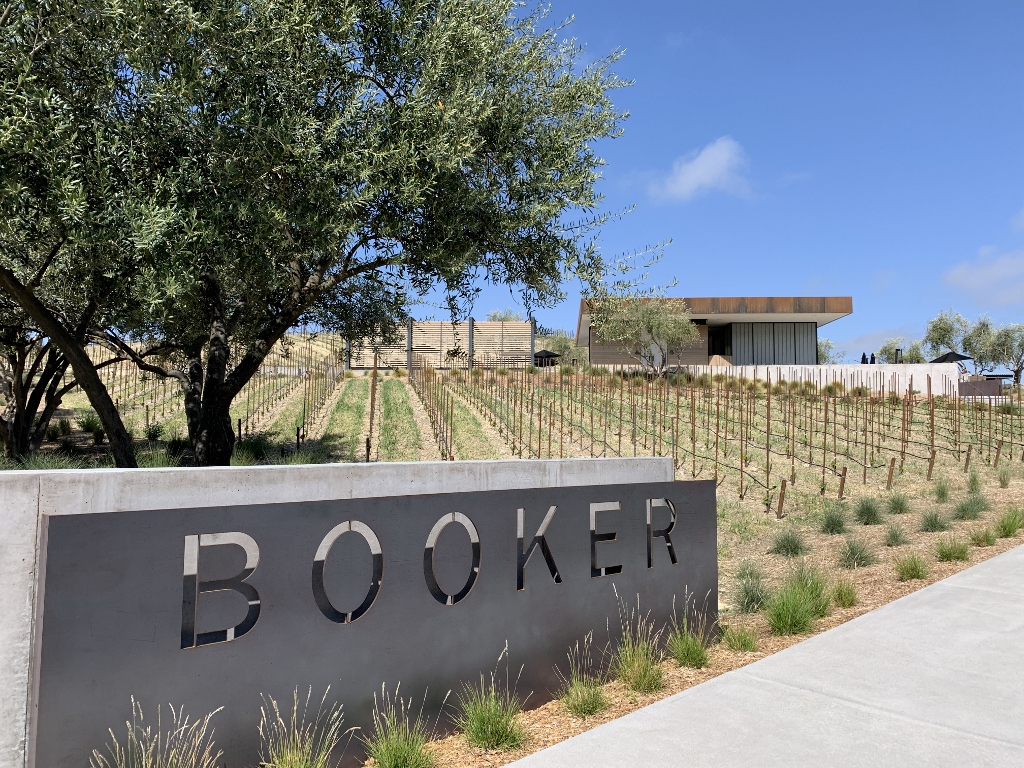
In 2001, Eric and Lisa Jensen purchased 100 of these acres, and wanted to grow the best fruit for nearby wineries. After a couple years, they decided to launch Booker Vineyard and in 2005, they had their first release. Their estate vineyard produces a variety of different wines, mainly Rhône varietals, using Organic and Biodynamic farming practices.
Don’t Miss! The new tasting room and cave – The tasting room is a beautiful piece of architecture overlooking the vineyards with a cantilevered trellis shading an outdoor sitting area, plus a bocce ball court.
Don and Susie Law’s mission was to find land that could produce ultra-premium, limited production, Rhône and Priorat style wines. After two years of searching numerous different sites, they finally found the future home for Law Estate Wines. This special piece of property has the limestone rich soil, high altitude and steep terrain that would allow Don and Susie to create the wine they had been dreaming about.
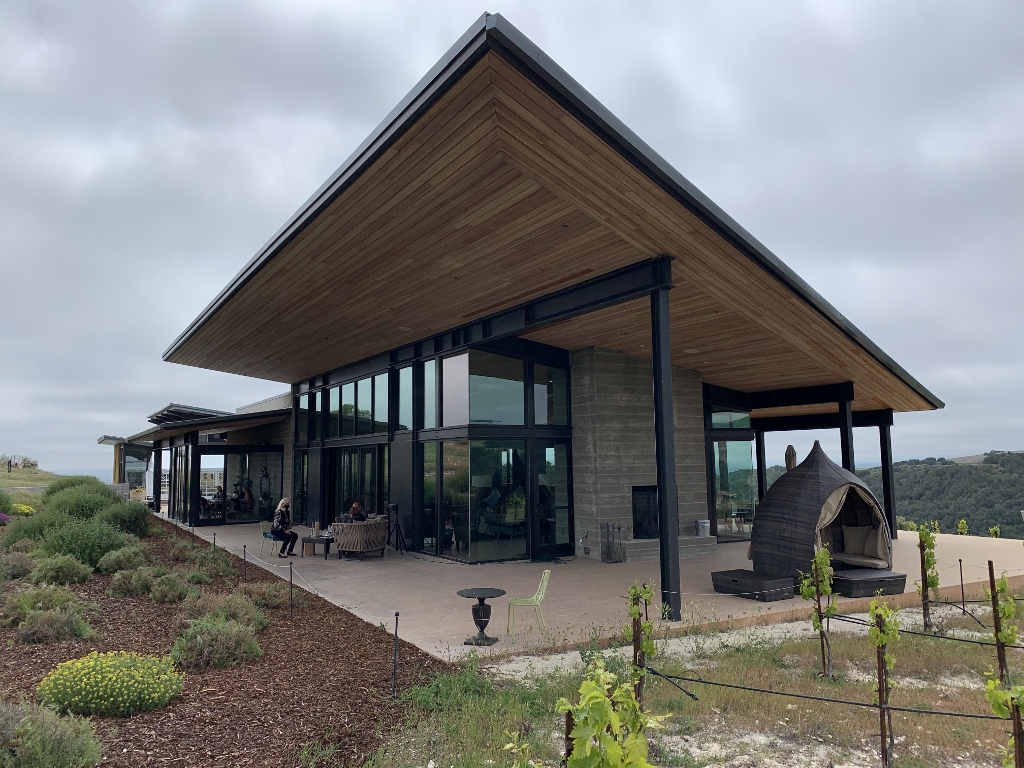
Today the LAW Winery Estate sits high above Peachy Canyon Road overlooking many miles of vineyards and mountain ranges. We entered the winery through an oversized steel door in the subterranean level of the building, a stunning steel, glass, and concrete structure designed by Bar Architects of San Francisco. This building houses the wine making facility, storage areas and tasting room, where visitors enjoy the estate grown, hand-crafted, one-of-a-kind wines. There are over a dozen varietals planted on 80 acres, with most vines planted back in 2008. Grenache and Syrah account for over 50% of the planted fruit.
The philosophy to wine making here matches the minimalist design of the winery. Solar panels generate power for the wine making process and gravity flow is favored over pumps. Fermentation takes place in concrete, and aging is in French oak. Wines are bottled unfined and unfiltered and spend an additional 18 months in the bottle before being released. The results easily live up to the early goal of Don and Susie of creating world class wines.
Villa Creek Cellars and MAHA Estate
Chris and JoAnn Cherry greeted us warmly outside their tasting room on their Westside estate. They shared their story of how they moved to Paso Robles in 1996 to open a restaurant and raise their children in the country. They emphasized the importance of small steps to help the community and beyond learn about how to craft organic and biodynamic wines.

Chris told us that, “In 2001 we began sourcing Grenache, Syrah and Mourvèdre grapes from vineyards that are farmed without pesticides and herbicides to make wine for our restaurant. And so began Villa Creek Cellars, our best expression of west Paso Robles’ Rhone grape varieties. In 2017 we closed our restaurant to devote the entirety of our blood, sweat, tears and resources to our winery and Demeter certified biodynamic and CCOF certified organic vineyard in the hills west of Paso Robles. We continue to purchase grapes from our region’s most esteemed organically farmed vineyards and strive to create exciting wines that reflect the land from which they originated. In 2019 we released our first all estate wines under a new label, MAHA Estate.”
The tasting room and winery is located on their certified biodynamic and certified organic MAHA Estate Vineyard. Here you can taste the soul of their wines – delicate fruits, minerality, handcrafted with assistance from ingredients only found in nature, never anything else. After our tasting outdoors, I peered into their indoor tasting room and saw the wine cellar and hanging bone-in Jamon gently curing away like it has done for centuries. Just two more years to go!! Bone-in Jamon and fine wine – a wonderful offering from Villa Creek Cellars.
We met Sherman Thacher outside of the tasting room near their 100-year old Kentucky Ranch Barn marked with the initials “KR”. He noted, “For decades quarter horses, cattle and cowboys roamed the grassy hills of the historic Kentucky Ranch. Today we are full of casual charm, reminiscent of California past and present. Since 2004 Thacher Winery with the grasshopper label, has been handcrafting wines from superb vineyards located throughout California’s Central Coast. Our boutique production demonstrates local subtleties and true local terroir.”
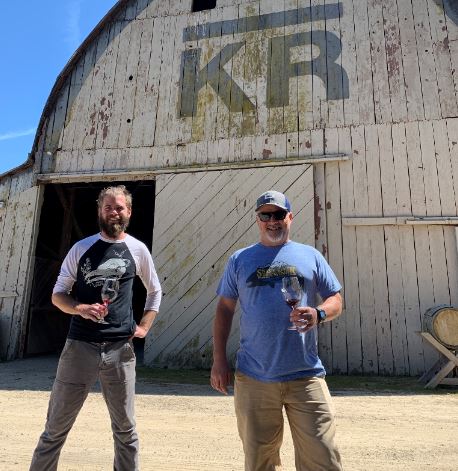
In 2010, he and his wife Michelle drove down from the Bay Area to attend a wedding in the “KR” barn and fell in love with the land with hayfields and oak trees and vistas of rolling hills. They stayed and began their boutique family-owned winery producing around 5,000 cases of ultra-premium award-winning wines. As we continued our visit, his Assistant Winemaker Daniel joined in the conversation and shared his insights on their bold and innovative heirloom wines. It’s their daring innovations that produce unique award-winning wines. Together they share a wine making philosophy that is grounded in tradition but enlivened with experimentation. The results are wonderful.
Maggie Tillman met us at her family’s tasting room and looked at us with a twinkle in her eye and said, “Follow me, I’m taking you up to the Oak Tree for a tasting.” Her dog Honey jumped into her dirt covered SUV, and we started the five minute drive up steep switchbacks and curves, to a lone Oak tree overlooking her family’s 130 acre ranch with 31 acres of grapes. From here there is a stunning view of the surrounding farmland and countryside. Maggie explained that most visitors to the winery taste their wines in the tasting room area, but they invite VIP members and special guests to this beautiful spot for an unforgettable tasting experience.
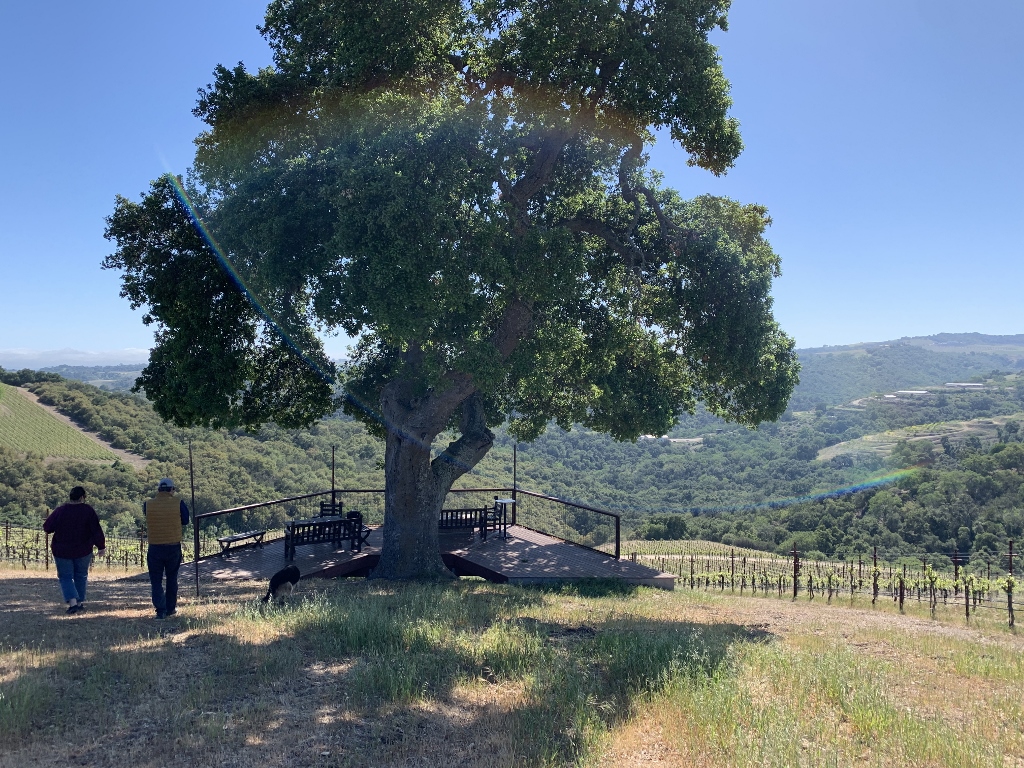
Maggie shared her family’s story, “Starting from the ground up was top priority for my father Bob Tillman, because, after all, wine is grown, not made. In 2003, Bob first walked the high elevation property that would become Alta Colina Vineyard. After 35 years as an engineer by day, home winemaker by night, Alta Colina is his vision from ground to glass.”
Today, Alta Colina is one of the Central Coast’s most acclaimed Rhône producers of estate-grown wines. Maggie is continuing the tradition of quality and sustainability instilled by her parents, Bob and Lynn. Signature wines include Claudia Cuvee Marsanne, Model Citizen Roussanne, 12 O’Clock High Viognier, GSM, Sun Worshipper, Toasted Slope Syrah, Old 900 Syrah, and Ann’s Block Petite Sirah.
Tip! Looking for a unique place to stay in Paso Robles? Check out the Trailer Pond at Alta Colina. Enjoy a private and relaxing camp out on 130-acre organically farmed Alta Colina Vineyard, located in Paso Robles highly-acclaimed Adelaida District
Gary Eberle received a Ph.D. in Enology and Viticulture, played football at Penn State, and in 1979 he began his career as a winemaker and Eberle Winery launched.
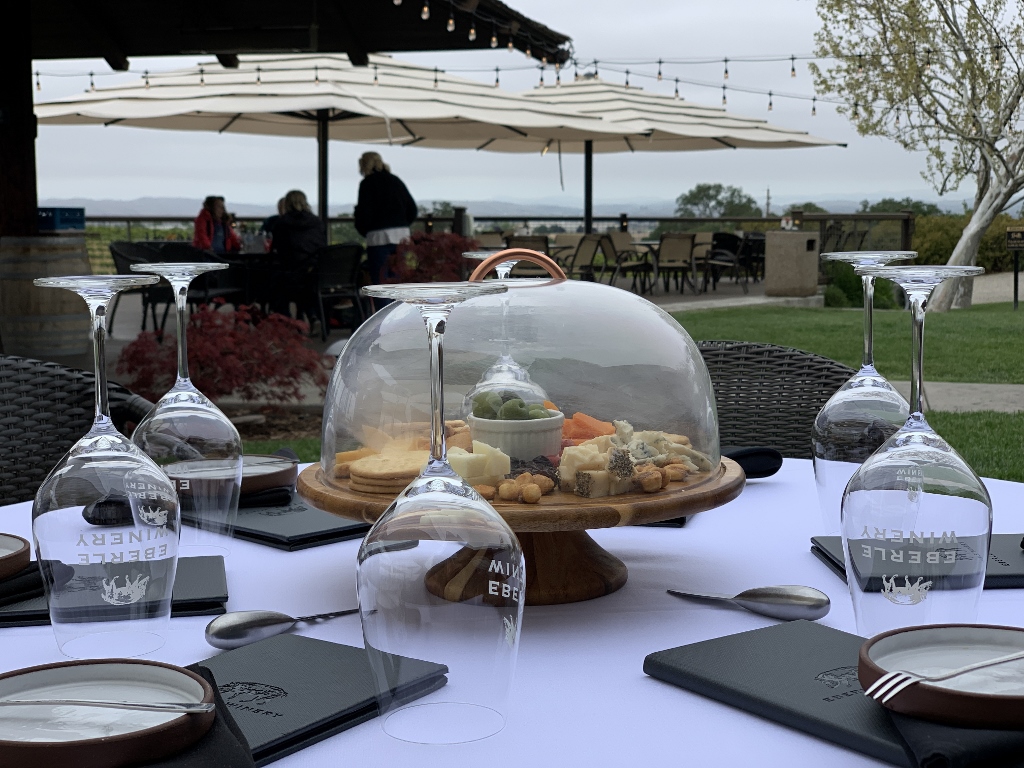
We met Stacy Bonnifield at the vineyard deck where guests enjoy tastings and even wood fired oven pizzas. Stacy grew up on a ranch in the area and has worked with Gary for over 10 years as the Sales Manager. She noted during our cave tour, “Gary is a pioneer of the Paso Robles Wine Region and helped to create the Paso Robles AVA. He helped establish his family’s Estrella River Winery & Vineyards, and in the late 70’s, he decided to pursue his own project and acquired nearly 64 acres just down the road from Estrella River Winery. Shortly thereafter, Gary released his first Eberle wine, the 1979 Cabernet Sauvignon named debuting the iconic boar logo, depicting the German origin of the name Eberle, meaning small boar. This year we are celebrating Gary Eberle’s American Wine Legend Award from Wine Enthusiast!”
During our tour, we noticed a wall of award ribbons that Eberle has won as one of the highest award-winning wineries and ranks one of the top 10 of gold medal award-winning wineries in the U.S.A. Eberle was the first in the country to produce a 100% Syrah. The winery is also known for its Cabernet Sauvignon, Viognier, Chardonnay, Zinfandel, Rose, Barbera, Sangiovese, and Muscat Canelli.
Riboli Family of San Antonio Winery
The Riboli Family has 104 years of wine-making experience. Since 1917, there are four generations in this family who have been rooted in hard work. Their family’s love of the land and gestures of hospitality, can be experienced at San Antonio Winery where they offer Italian cuisine at their café bistro where you can dine alfresco.
We met Tracy Robbins, Winery Manager who shared with us, “With World War II on the horizon, Stefano Riboli returned to the United States and a few years later married Maddalena Satragni in 1946. The winery had already been an established institution in California’s wine community. During this time, the wine industry existed primarily in Southern California. But, by the 1950s, Northern California regions started to gain momentum in the winemaking business and soon took over a majority of the industry. However, staying true to where they had been blessed by good fortune, Santo, Stefano and Maddalena decided to remain with their families in Los Angeles. From their estate vineyards in the Paso Robles, Monterey, and Napa, they produce a range of varietals under the San Simeon, Maddalena, Highlands 41, Opaque, Windstream, and Riboli Family labels.”
Vina Robles Vineyards & Winery
Hans Nef came from a rural village outside Zurich, Switzerland and moved to the Central Coast of California in the 1990’s. He appreciated California wines and was drawn to the unique terroir in the Paso Robles area. He pursued his dream to produce world-class wines and founded Vina Robles. “I want Vina Robles to express a unique balance of European heritage and American opportunity. As individuals, we are rooted in the Old World. As viticulturists and winemakers, we are empowered by the New World.” – Founder Hans Nef
In 1996 Nef asked his fellow colleague and friend, also named Hans – Hans R. Michel, a Swiss expatriate, to join as managing partner. The Hans and Hans duo planted the first vineyard and Vina Robles was born. In 2012, they asked Winemaker Kevin Willenborg to join the team.
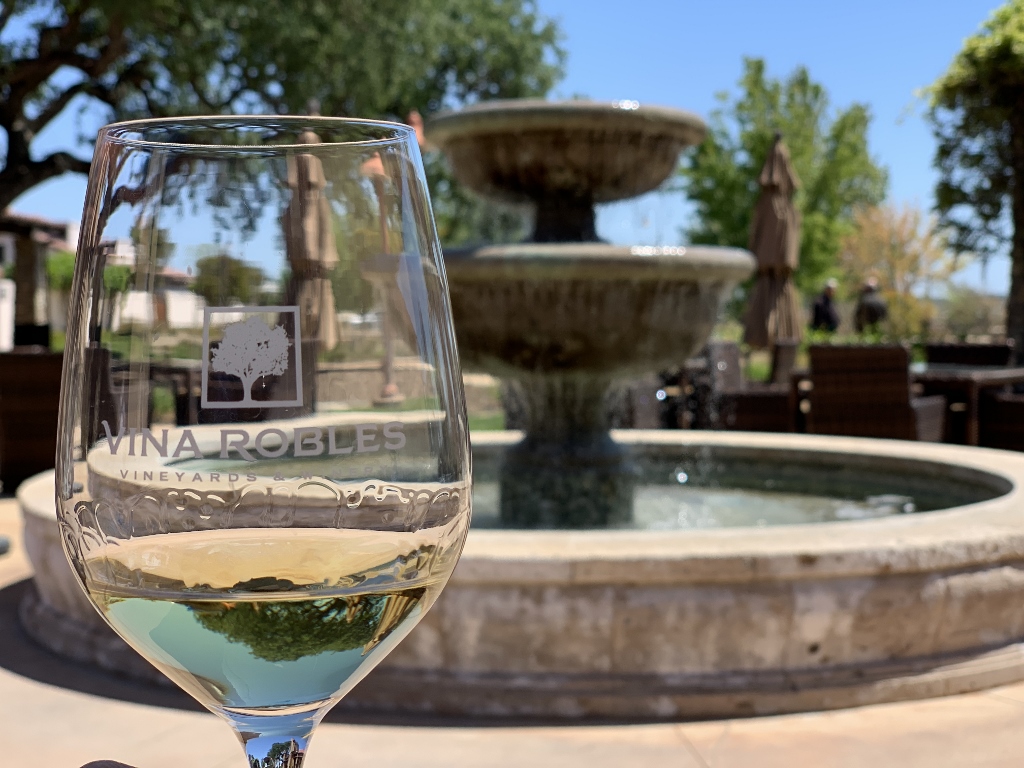
We met Catherine Jaeger, Director of Marketing, in the courtyard by their iconic fountain and she noted that, “Vina Robles owns and farms six estate SIP® Certified Sustainable vineyards in five sub-districts in the region. The vineyards & winery are owned and managed by two Swiss families who have been farming wine grapes in Paso Robles for more than 20 years. Known primarily for their Cabernet Sauvignon and Petite Sirah, the Vina Robles lineup includes small lots of a wide range of varieties and creative blends. While adhering to traditional winemaking methods, veteran winemaker Kevin Willenborg implements modern technologies to make his estate wines with minimal intervention.”
The classic California Mission-style design and modern European elegance at Vina Robles is beautiful. We dined alfresco in the courtyard and sampled dishes from Bistro Vina Robles that were perfectly paired with our tasting. The wines were wonderful, and the dining experience was first class. A very enjoyable visit.
Don’t Miss! The Vina Robles Amphitheatre celebrated its grand opening and now hosts 30 world-class artists April through October each year.
Located on the eastside of Highway 101, we visited the Robert Hall Winery and met Tasting Room Manager Alyssa Hall (no relation to Robert).
She shared with us that “Robert Hall had a life-long passion for wine and the winery lifestyle. He viewed all his business success as a well-earned opportunity to venture west in search of the perfect landscape, and the perfect partner to help him realize his true dream. Acclaimed winemaker Don Brady has been the creative force behind our award-winning wines since the beginning. Through his hands-on approach, Don has been pivotal in bringing acclaim to Paso Robles wines, and instrumental to elevating the valley’s status as the premier winemaking region. Our estate-grown varieties have big, bold characteristics and our wines are crafted with rich, complex flavors.”
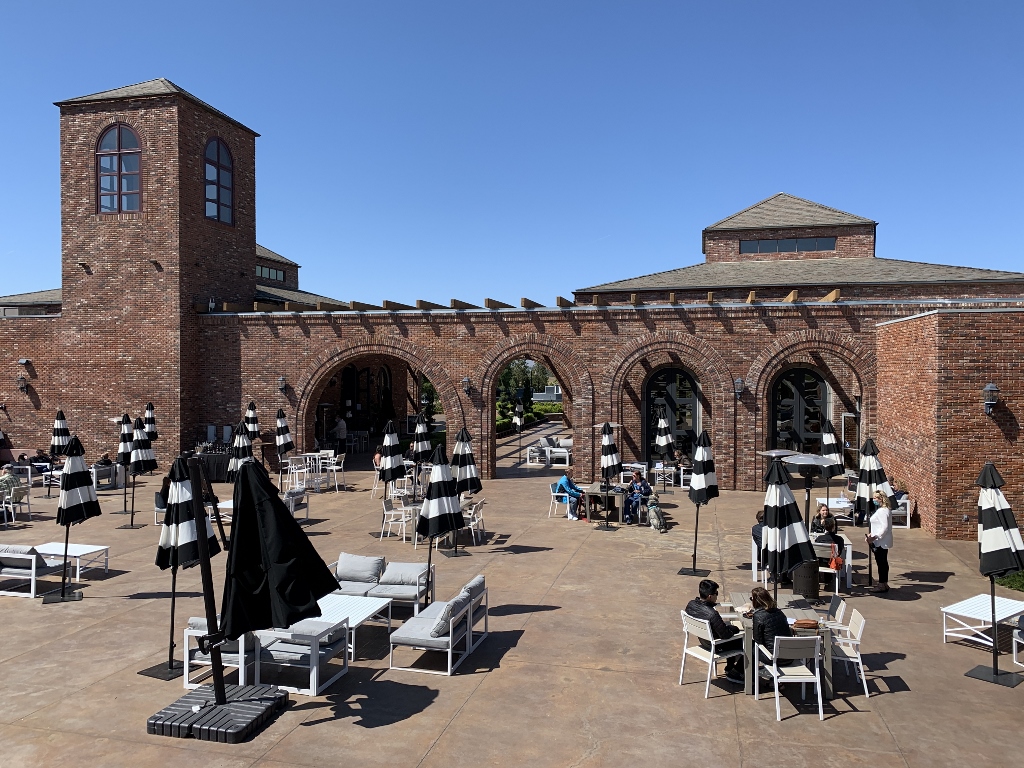
The wide-open terrace is a great spot to grab a bite with locally sourced ingredients paired with the limited-production Cavern Select wines. This is also a good spot to explore the expansive cavern and vineyards and learn about regenerative farming practices.
Founder Doug Ayres heart strings were pulled on a road trip to Paso Robles. The beauty of the land, warmth of the people, and emerging wine region peeked his interest. He followed his heart and purchased land and his vineyards today make world-class wine. He also developed the legendary Allegretto Vineyard Resort, where guests arrive for a tasting and don’t want to leave!
Doug shared, “My great-grandfather arrived in California in 1905, pioneering what became Ayres Hotels. I arrived in Paso Robles a century later, enchanted by its terroir. It was my dream to extend our family’s hospitality by sharing these artfully made wines with visitors … inspired and crafted with joy.“
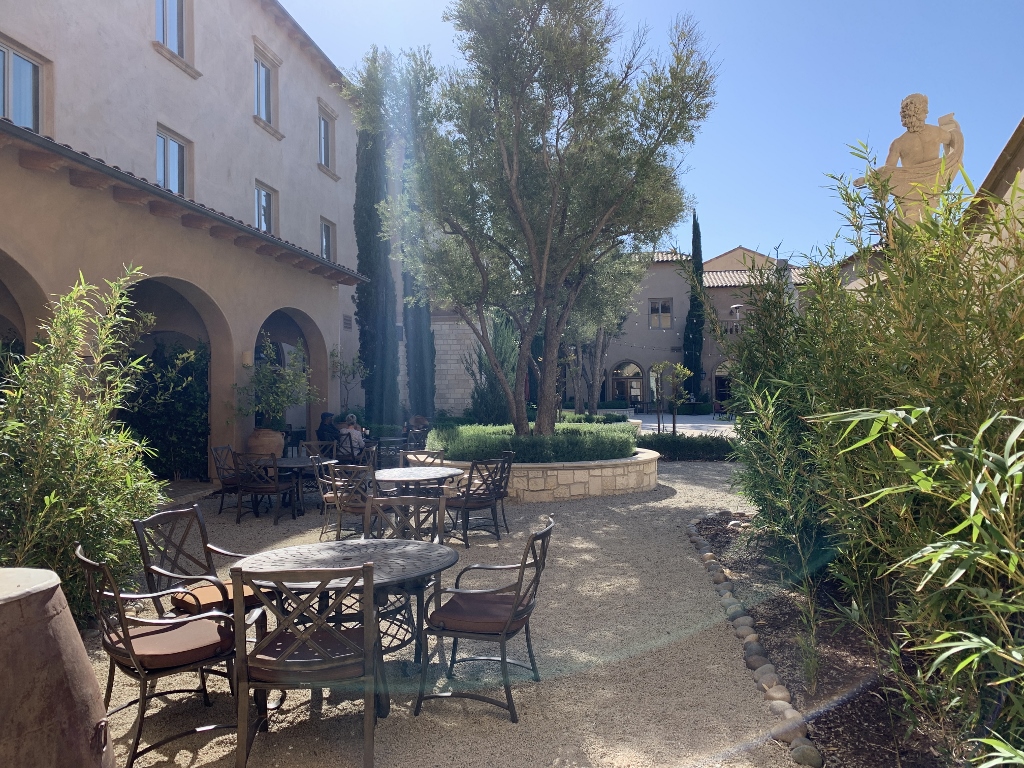
Liz Strubbe, Director of Hospitality shared, “At Allegretto Wines, we wield a gentle and sustainable hand over the highly selective small-lot vineyard sites we steward. When you visit our service-driven tasting room and tilt back a glass of our wine, you’re drinking in the true essence of Paso Robles’ rich and seductive terroir. These estate and single vineyard wines are sourced from the vineyards surrounding our tasting room, as well as our west side vineyard in the Willow Creek District.”
The Allegretto Wines Tasting Room is located on the Eastside of Paso Robles inside the Allegretto Vineyard Resort. Guests are presented with a flight that includes your choice of four artisan wines to enjoy. Sit in the Piazza del Magica courtyard by the fountain and stone sculptures surrounded by olive trees.
Don’t Miss! Sign up for the curated Art Tour at the Allegretto Estate – check with the concierge for dates and times.
NINER is a family-owned company located in the Willow Creek District at the Heart Hill Vineyard.
Founder Richard Niner grew up on a farm in West Virginia. He spent his career building small businesses, and one of the businesses brought him to Paso Robles in the 1990’s. He was taken by the hospitality of the locals and the potential of the land. In 2001, he and his wife Pam purchased their first vineyard, Bootjack Ranch, and spent a decade building a tasting room and winery, planted two more vineyards and hired a team to grow NINER.
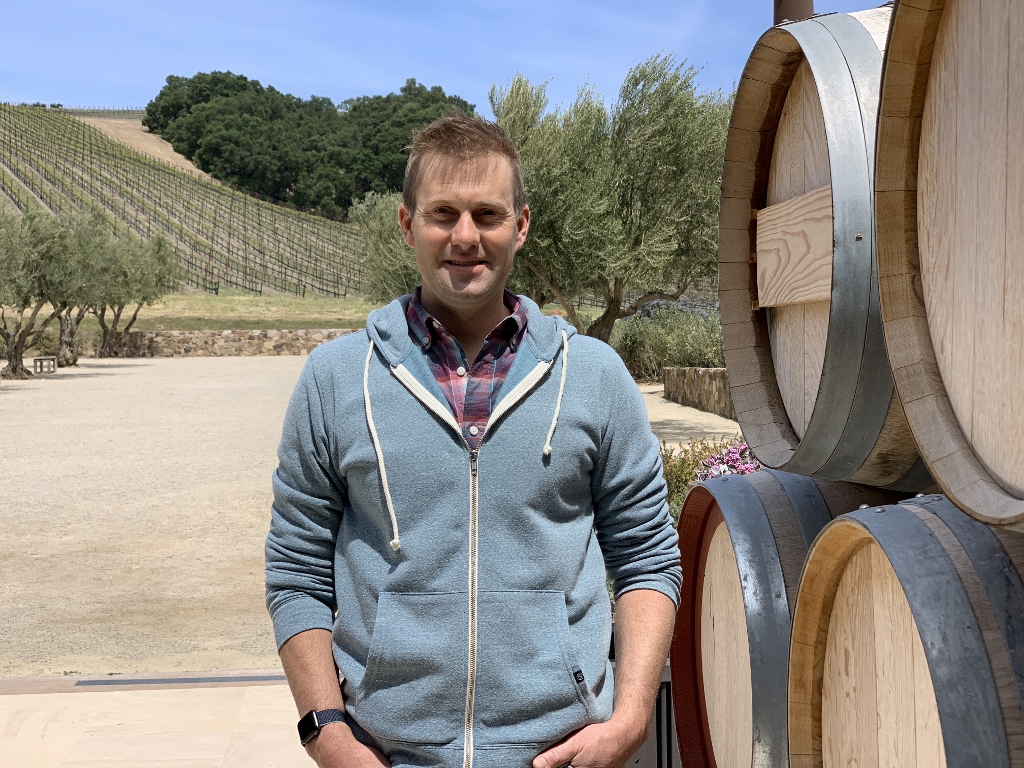
We met Andy Niner, who now runs the family winery and restaurant. He shared, “We farm a total of 240 acres across three different vineyards in Paso Robles and Edna Valley: Bootjack Ranch in the Paso Robles Geneseo District, Heart Hill Vineyard in the Paso Robles Willow Creek District and Jespersen Ranch in Edna Valley, and make all our wines at our SIP Certified Winery at Heart Hill Vineyard. We are known for our 100% estate-grown Cabernet Sauvignon, Pinot Noir and Chardonnay as well as our flagship blend Fog Catcher; however, we grow a wide range of varietals and specialize in small lot bottlings that we allocate to our Wine Club Members.”
Don’t Miss! Take time to enjoy the solar powered & LEED Certified tasting room, restaurant & winery with panoramic views of the famous Heart Hill. The winery is easily seen from the main road with distinctive barn size stone architecture. The exterior has the look of hand hewn craftsmanship of a bygone era. A highlight on our trip was the gourmet lunch at the NINER Restaurant in the heart of the Paso Robles wine country.
We made a quick stop to visit Tablas Creek Vineyard in the calcareous Adelaida District, chosen for its similarities to Chateauneuf-du-Pape. This winery is known as a pioneer of California’s Rhone movement, and the first Regenerative Organic Certified vineyard in the world.
The Tasting Room Manager shared the story, “Tablas Creek is the realization of the combined efforts of two of the international wine community’s leading families: the Perrin family, proprietors of Château de Beaucastel, and the Haas family of Vineyard Brands. Equally owned and run by the two families, the partnership begun in 1987 remains today as ever, even as the next generation of Haases and Perrins have stepped into leadership roles over recent decades. Château de Beaucastel has been one of Chateauneuf-du-Pape’s greatest estates for decades. First mentioned in the literature in 1549, when the noble Pierre de Beaucastel bought a plot of land in the commune of Coudoulet, it has been run by the Perrin family for five generations, since 1909. Jacques Perrin, who oversaw the estate in the 1950s, 1960s, and 1970s, has been recognized for bringing the region to recognition, for being a pioneer of organic farming, and for leading the regeneration of traditional grape varieties, most notably Mourvedre.”
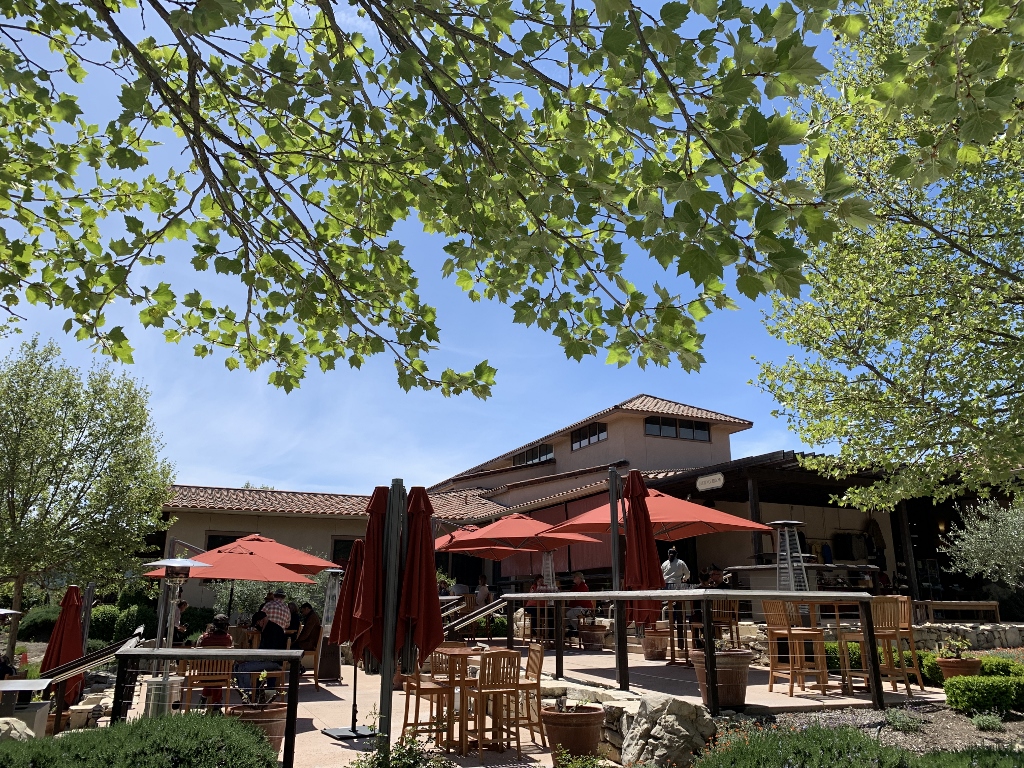
He shared that “the families imported vine cuttings from Southern Rhone, including new clones of Roussanne, Grenache Blanc, Marsanne, Viognier, Picpoul Blanc, Mourvedre, Grenache, Syrah, and Counoise, was imported from Beaucastel. Cuttings were made available to the wine community, which helped kick off the modern “Rhone Ranger” movement. The vineyards are fertilized by a mobile herd of sheep and alpacas, while soils are built naturally by composting and cover crops. We received the wine world’s first Regenerative Organic Certification in 2020, which certifies our commitment to soil health, carbon capture, water use reduction, animal welfare, and farmworker fairness.”
Founder Justin Baldwin’s vision was to combine Old World methods like hand-harvesting and small-barrel aging in French oak, with New World technology, creating big, Bordeaux-style wine. In 1981, he founded JUSTIN Vineyards & Winery and planted the first vines. Since those early days the acreage and production has increased, but JUSTIN remains committed to the same ideals and philosophy 40 years later.
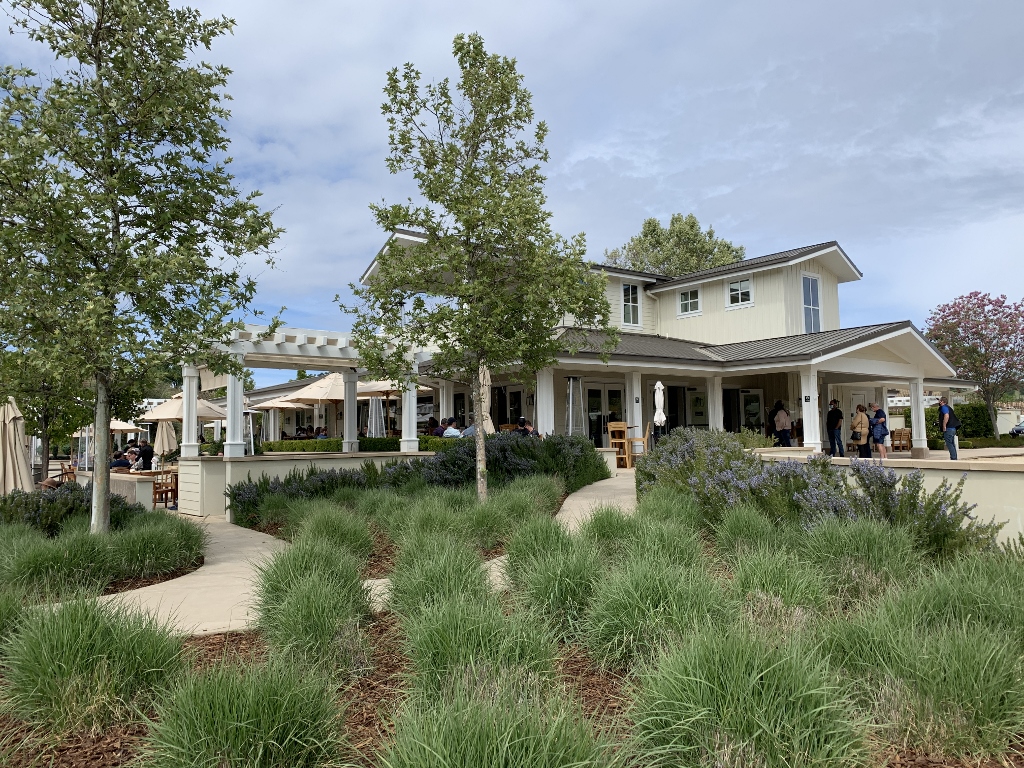
Timothy Argie at JUSTIN told us “The soil is rich in fossilized limestone with marine deposits that stress the vines – perfectly suited for big Bordeaux reds, and the unique microclimate with wide temperature swings and marine layers coupled with the hot days bring out the intense flavor and the cool nights create great structure and balance.”
Our visit was too brief at JUSTIN, and we hope to return to enjoy a stay at their JUST Inn, dine at their restaurant and tour their vineyards.
As a namesake of the Adelaida District, Adelaida Cellars is one of the area’s most historic wineries. Situated minutes from town on Adelaida Road, it feels many miles away when you visit Adelaida Vineyards & Winery. It’s just 14 miles from the Pacific Ocean and tucked away in the mountainous terrain of Paso Robles at 2,000 feet.
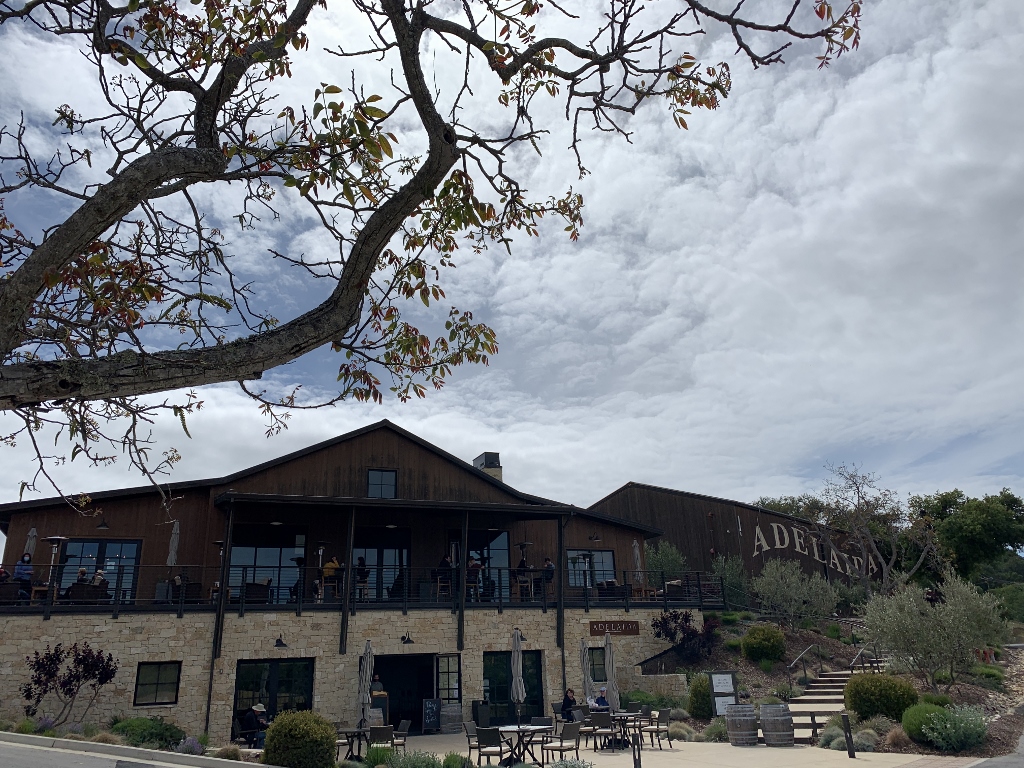
Andrew Carlson at Adelaida told us, “There’s a wide range of mesoclimates, aspects and soil types in our six vineyards, all farmed organically. Adelaida Cellars produces Cabernet Sauvignon, Pinot Noir, Syrah and Rhône-inspired blends, Zinfandel and others.”
The tasting room at Adelaida Vineyards & Winery is open daily where you can sip on the terrace and enjoy vistas of rolling hills, vineyards and organic walnut orchards.
You can’t leave Paso Robles without a visit to DAOU Mountain! It’s one of the most picturesque and stunning wineries in the region. Located in the heart of the Adelaida District, from the top of the mountain, you have a panoramic, almost 360 degree vista of DAOU’s 212-acre hilltop estate and views across the rolling hills to the rugged coastal range.
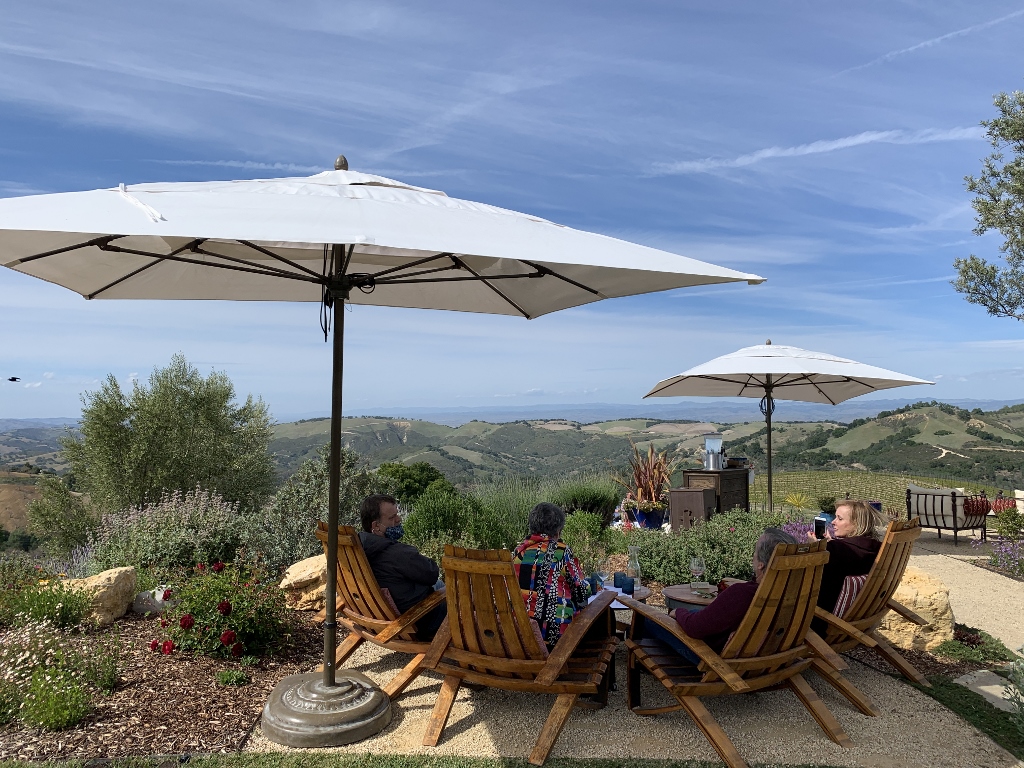
The Daou family history going back over the last 65 years is pretty incredible. From one of the most successful furnishings companies in the entire middle east, to near tragedy in the Lebanese civil war, to fulfilling the American dream, it has been an epic journey.
In the late 90s with their father’s blessing the Daou brothers left behind the world of technology and struck out for Paso Robles to follow a dream that had been in the back of their minds since their days in the south of France 20 years earlier. Today Georges and Daniel Daou run the DAOU Family Estates winery and Daniel is the wine maker.
Kirsten George, the Estate Director noted that “The remarkable geology, favorable microclimate, and 2,200 feet elevation were once described by renowned California winemaker André Tchelistcheff as “a jewel of ecological elements.” The most beautiful expression of wine comes from terroir. In simplest terms, terroir is soil and climate. Great wines require exceptional terroir. DAOU Mountain is created from a very rare soil, calcareous clay. This soil, famously found in Saint-Émilion and the right bank of Bordeaux, is composed of clay with a calcareous and limestone subsoil perfect for growing Cabernet Sauvignon and Bordeaux varieties. This is the soil Georges and Daniel sought when they searched around the world for their dream vineyard. DAOU mountain is cooled by the Pacific Ocean, fourteen miles away, and gentle breezes that flow over the Templeton Gap. Warm, temperate days and cool nights guarantee even ripening and vine balance every year. We have, arguably, the most perfect climate in the world to ripen Bordeaux varieties and Cabernet Sauvignon. The Daou Family are stewards of this beautiful terroir, and the Daou brothers’ vision is to produce California “first-growth” wine, fulfilling the Adelaida District’s destiny as the world’s next benchmark for Bordeaux varieties.”
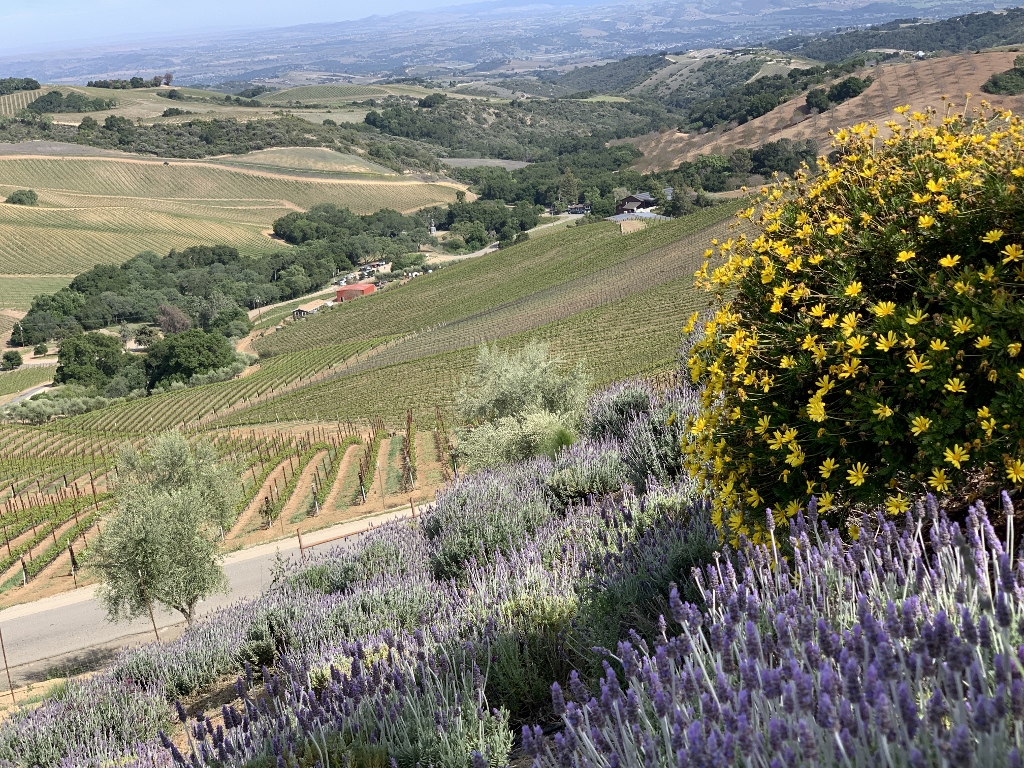
“There is a power within this Mountain we call home. It is a power that can turn mere raindrops and roots into extraordinary wines—and into lasting relationships—that will endure for decades. Everyday we strive to create an experience as beautiful as these wines, ensuring that everyone who leaves here feels like family. There is nothing more important than human connection.” Georges & Daniel Daou, Proprietors
The outdoor tasting area is breathtaking and offers a one-of-a-kind environment unlike anything you are likely to see anywhere in the world. You feel as if you are sitting on the edge of the mountain, the entire mountainside disappearing below. There are wonderful bites with a Lebanese flair to pair with your tasting. Everything we tried was amazing. This is a place where you can relax and take in the view or it can easily be a little more up tempo. Whatever you want it to be. You will not be disappointed.
————————————————————–
Good to note: In observance of all COVID-19 protocols, wineries observe all guidelines as recommended by the CDC and health organizations. Tasting Rooms are open by reservation. Be sure to check the winery’s website for tasting hours and book a reservation before your visit. Large Groups: At this time, to comply with COVID-related guidelines, wineries cannot accommodate groups over 6. The tasting rooms in Paso Robles are actively monitoring national and local guidelines for social distancing and have implemented extra precautions to keep spaces sanitized and accessible for guests.
Acknowledgments Global Adventuress would like to thank the Paso Robles Wine Country Alliance and Parker Sanpei for arranging most of our winery visits and sharing some of the content above.
ABOUT PASO ROBLES WINE COUNTRY ALLIANCE
The Paso Robles Wine Country Alliance is the official trade organization that represents wineries, growers, and businesses in Paso Robles Wine Country. Centrally located between San Francisco and Los Angeles, along California’s Central Coast, Paso Robles Wine Country is California’s third-largest wine region. It encompasses more than 40,000 vineyard acres and 200 wineries. For more information, visit Paso Wine. Facebook – @PasoRoblesWine, Instagram – @Pasowine, #pasowine.



